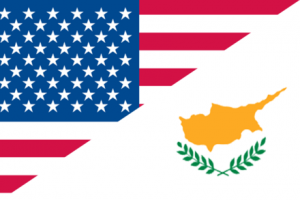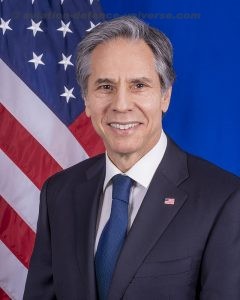
- Secretary Blinken’s Call with Republic of Cyprus Foreign Minister Christodoulides
By Chaitali Bag
Larnaca. 05 June 2021. When US Secretary of State Antony J. Blinken spoke with Republic of Cyprus (ROC) Foreign Minister Nikos Christodoulides recently, many eyebrows of geopolitical observers raised surprised that a small Mediterranean nation is high up on the agenda of new US administration. Both the leaders reaffirmed their mutual commitment to deepening the strong U.S.-ROC bilateral relationship.
Bilateral relations between the Republic of Cyprus and the United States of America are excellent . Reasons can be many. Cyprus is a vibrant democracy in a volatile region and if need arises can serve as a forward base for the United States. In the past on many occasions, military bases, ports and airports have been used for humanitarian and support purposes by the US.

The Secretary and the Foreign Minister agreed on the importance of promoting stability in the Eastern Mediterranean through regional cooperation and peaceful resolution of disagreements. The Secretary pledged continued U.S. support for Cypriot-led, UN-facilitated efforts to reunify the island as a bizonal, bicommunal federation for the benefit of all Cypriots, as the United States encourages both sides to demonstrate the necessary openness, flexibility, and compromise to find common ground to restart Cyprus settlement talks.
Both the nations agree on bilateral strategic partnership with the European Union, of which Cyprus is a member state. Their bilateral partnership focuses in areas of common interest, such as peace, security, trade and investment, diversifying European energy sources, and protecting cultural heritage across the island.
Secretary Blinken expressed support for the 3+1 diplomatic mechanism, which includes the ROC, Greece, Israel, and the United States. The Secretary stressed the importance of efforts to counter harmful influence from Russia and China in the region. In 2018, the United States and the Republic of Cyprus signed a Statement of Intent to strengthen and develop their security relationship. The agreement encompasses efforts to combat terrorism, enhance maritime security and further promote regional stability in the Eastern Mediterranean.

And a few days post this telephonic conversation, news emerged that a US-funded training facility, the Cyprus Centre for Land, Open-seas, and Port Security (CYCLOPS), will become operational in mid-January 2022. A groundbreaking ceremony at the site in Larnaca was held in January. The Foreign Minister of Cyprus Nikos Christodoulides and The US Ambassador to Cyprus Judith Garber inspected the progress on 3rd June 2021. United States will provide technical assistance related to security and safety, including customs and exports control, port and maritime security and cybersecurity, at CYCLOPS.
The United States and The Republic of Cyprus established official diplomatic relations in 1960, right after the British Cyprus’s independence from the United Kingdom. Differences immediately arose between the majority Greek Cypriot (77.1%) and minority Turkish Cypriot (18.2%) communities during the implementation of the Constitution of Cyprus provided at the time. Subsequently, inter-communal violence led to the establishment of the United Nations Peacekeeping Force in Cyprus in 1964. In 1974, a Coup d’état backed by the Greek military junta of 1967–1974 failed to provide Enosis (union) with Greece. Subsequently, a Turkish invasion of Cyprus has followed, that resulted in the capture of approximately 40% of the island and a de facto division of its people and land since 1974.
The Republic of Cyprus is the only official government of the island state. 1/3 of the island nation is administered by Turkish Cypriots, through the “Turkish Republic of Northern Cyprus” proclaimed in 1983. The United States, does not recognize the “TRNC,” nor does any other country in the world except Turkey. About 30,000 Turkish Troops remain on the island while the “Green line” buffer zone is patrolled by UNFICYP. The United States regards the status quo on the Cyprus dispute as “unacceptable” and fully supports the UN-led inter-communal negotiations as the rightful venue to achieve a fair settlement.

In December 2019, the US Congress lifted a decades-old arms embargo on Cyprus. On 2 September 2020, United States decided to lift embargo on selling “non-lethal” military goods to Cyprus for one year starting from 1 October. Mike Pompeo the Secretary of State in Donald Trumps government had stated, “Cyprus is a key partner in the Eastern Mediterranean. We will waive restrictions on the sale of non-lethal defence articles and services to the Republic of Cyprus for the coming fiscal year.” Cyprus has been embargoed since 1987 under the International Traffic in Arms Regulation (ITAR), a US body which restricts the export of defence and military goods.
U.S. Congressman David N. Cicilline (RI-01) successfully included an amendment in the National Defense Authorization Act for Fiscal Year 2020 under consideration in the U.S. House of Representatives today to end the U.S. arms embargo in Cyprus, which currently forces the nation to depend on other countries, including those that may pose challenges to U.S. national security interests around the world, for defense-related materials.“The Republic of Cyprus has long been a key ally in the fight against terrorism and emerging threats in Europe, but for more than 25 years, this embargo has not reflected the strength and importance of that relationship,” Cicilline said. “Ending this outdated policy by passing my amendment is critical in maintaining stability in the region and a strategic partner for generations to come. I thank my colleagues for their continued support of the U.S.-Cyprus relationship and for their support of my amendment.”
“During our phone call with Secretary Pompeo we both expressed our serious concerns on the volatile situation in the Eastern Mediterranean. We further stressed the importance to ease tensions in the region, in view of #Turkey’s aggressive behaviour. I welcome the lifting of the #US arms embargo on non-lethal defense articles. A positive development which reinforces further the bilateral security relationship between Cyprus and the United States,” stated President of the Republic of Cyprus Nicos Anastasiades in tweets post the lifting of embargo.
No prizes for guessing that Turkey expressed unhappiness over this decision and stated, “It is certain that this decision will also have negative effects on the efforts to reach a settlement to the Cyprus issue. We expect the US to reconsider this decision and support the ongoing efforts to establish peace and stability in the region. Otherwise, Turkey, as a guarantor country, will take the necessary decisive counter steps to guarantee the security of the Turkish Cypriot people, in line with its legal and historical responsibilities.” From the Turkish occupied Northern Cyprus came a statement saying, “the decision was not a step in the right direction” and they also called and expressed unhappiness over the development to the US Ambassador to Cyprus.

US states in it’s official web page, “We have been breaking new ground in our security relationship, beginning with the Statement of Intent on bilateral security cooperation that we signed with Cyprus in late 2018. Since then, our security partnership has continued to deepen, as witnessed by the accreditation of the ROC’s first Defense Attaché at its embassy in Washington, joint military exercises, port visits by U.S. naval vessels to Cyprus, and senior-level visits to the ROC by U.S. military leadership, including U.S. European Command Deputy Commander Stephen Twitty in January 2020. On December 2019, the Eastern Mediterranean Security and Energy Partnership Act of 2019 was signed into law as part of the FY 2020 Appropriations Act and the National Defense Authorization Act (NDAA) for FY 2020, highlighting the United States’ security interests in the Eastern Mediterranean region, including countering Russian malign influence.”
A look at the summary of the End the Cyprus Arms Embargo Act of 2019 is interesting. This bill modifies requirements for, and limits on, the transfer of defense articles and services to Cyprus.The Department of State shall generally not deny exports, re-exports, or transfers of defense articles or services to or from Cyprus if the request is made by or on behalf of Cyprus and if Cyprus is the end user of such articles or services. However, even if these conditions are met, the State Department may deny such a transfer based on credible human rights concerns.
Furthermore, the existing policy to deny exports, re-exports, or transfers of articles on the U.S. Munitions List to Cyprus shall remain in effect unless the President periodically certifies to Congress that Cyprus is (1) cooperating with U.S. efforts to reform anti-money-laundering regulations and financial regulatory oversight, and (2) taking steps to deny Russian military vessels access to ports for refueling and servicing. The President may temporarily waive the export denial policy for U.S. national security interests.
On October 1, 2020, the Department temporarily amended the International Traffic in Arms Regulations (ITAR) § 126.1(r) to reflect the temporary waiver of the policy of denial on the export, re-export, re-transfer and temporary import of non-lethal defense articles and defense services destined for or originating in the Republic of Cyprus (ROC). The temporary waiver is effective for one fiscal year. The policy of the United States for lethal defense articles and defense services destined for or originating in the ROC will remain unchanged, i.e., the denial of licenses. A Federal Register Notice will be published detailing the temporary amendment.
The temporary waiver will allow for commercial purchases of non-lethal defense articles and defense services described on the U.S. Munitions List. Potential exports to Cyprus will be reviewed on a case-by-case basis for compliance with U.S. law and policy, the same practice we follow with all our partners. The ITAR does not define “non-lethal.” The interagency license approval process will review potential exports to Cyprus on a case-by-case basis to ensure only non-lethal defense articles and defense services are approved for export.
Currently, the ITAR allows the commercial sale of defense articles and defense services for the United Nations Forces in Cyprus or for civilian end-users. The only change this temporary ITAR amendment makes is to enable the ROC government to purchase non-lethal defense articles and defense services.

Export authorizations issued by the Department’s Directorate of Defense Trade Controls (DDTC) may be valid for up to 48 months, or four years, and will not be automatically revoked or rescinded if/when the temporary amendment to the ITAR expires. The provisions of the Eastern Mediterranean Security and Energy Partnership Act of 2019 and the FY 2020 NDAA dictate that waivers can only be issued on a one-year basis.
It is a large step with strong footprints for Cyprus-US relationship and if Cyprus decides to import the Non-Lethal weapons it will give the East Mediterranean region an enhanced security envelope. So probably make hay while the sun shines should be the aim as a year doesn’t take much time to pass. All eyes are on this island nation with keen interest and both positive and negative stances. This decision could be a new phase for the region. Lets wait and watch.

























































































































